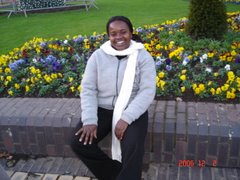Hi
Here is another mind blowing article on the componets that determine the human
diversity and indeed all living creatures on our planet earth.
The people on the driving seat are warning that,while these processes may be still at
work in other organism just like our super radiation of Lake Malawi cichlid fish, the story
is different in human populations.
However, as we live in an ever changing universe the story may not be as simple as we
may see it. In mind is the global warming issue. With most of the areas on earth
claimed to be at risk, the human population may be heading for a revolution of
their diversity in the near or distant future. The effective population size might
be at risk and random drift will play its part, thus reshuffling the diversity as
well.
All in all its intersting and informative to know how our diversity is struggling at
the moment.
Have a good time read on the article below.
Hastings
========
Press Assoc. - Tuesday, October 7 04:21 am
Human evolution is grinding to a halt, according to a leading genetics expert.
The gloomy message from Professor Steve Jones is: this is as good as it gets.
Prof Jones, from the Department of Genetics, Evolution and Environment at University College London, believes the mechanisms of evolution are winding down in the human race.
At least in the developed world, humans are now as close to utopia as they are ever likely to be, he argues. Speaking at a UCL Lunch Hour Lecture in London, Prof Jones said there were three components to evolution - natural selection, mutation and random change.
He said: "In ancient times half our children would have died by the age of twenty. Now, in the Western world, 98% of them are surviving to the age of 21. Our life expectancy is now so good that eliminating all accidents and infectious diseases would only raise it by a further two years. Natural selection no longer has death as a handy tool."
Mutation rate was also slowing down, he said. Although chemicals and radioactive pollution could cause genetic changes, one of the most important mutation triggers was advanced age in men. "Perhaps surprisingly, the age of reproduction has gone down - the mean age of male reproduction means that most conceive no children after the age of 35," said Prof Jones. "Fewer older fathers means that if anything, mutation is going down."
Random alterations to the human genetic blueprint were also less likely in a world that had become an ethnic melting pot, according to Prof Jones.
He said: "Humans are 10,000 times more common than we should be, according to the rules of the animal kingdom, and we have agriculture to thank for that. Without farming, the world population would probably have reached half a million by now - about the size of the population of Glasgow.
"Small populations which are isolated can change - evolve - at random as genes are accidentally lost. Worldwide, all populations are becoming connected and the opportunity for random change is dwindling. History is made in bed, but nowadays the beds are getting closer together. Almost everywhere, inbreeding is becoming less common. In Britain, one marriage in fifty or so is between members of a different ethnic group, and the country is one of the most sexually open in the world. We are mixing into a global mass, and the future is brown."
He added: "So, if you are worried about what utopia is going to be like, don't; at least in the developed world, and at least for the time being, you are living in it now."
Tuesday, October 7, 2008
Subscribe to:
Post Comments (Atom)






No comments:
Post a Comment